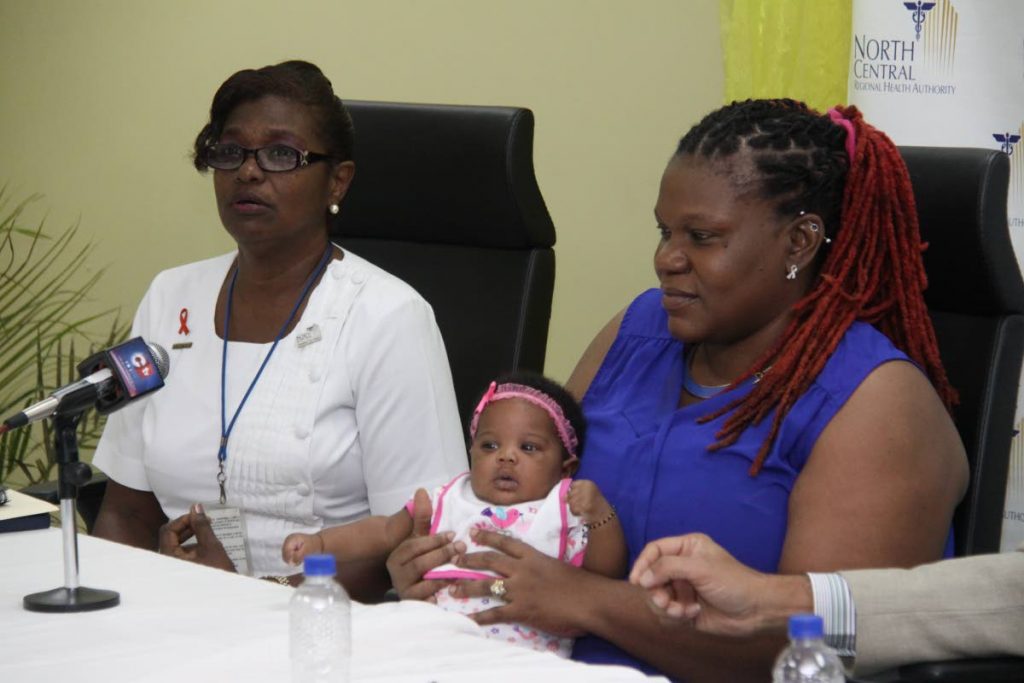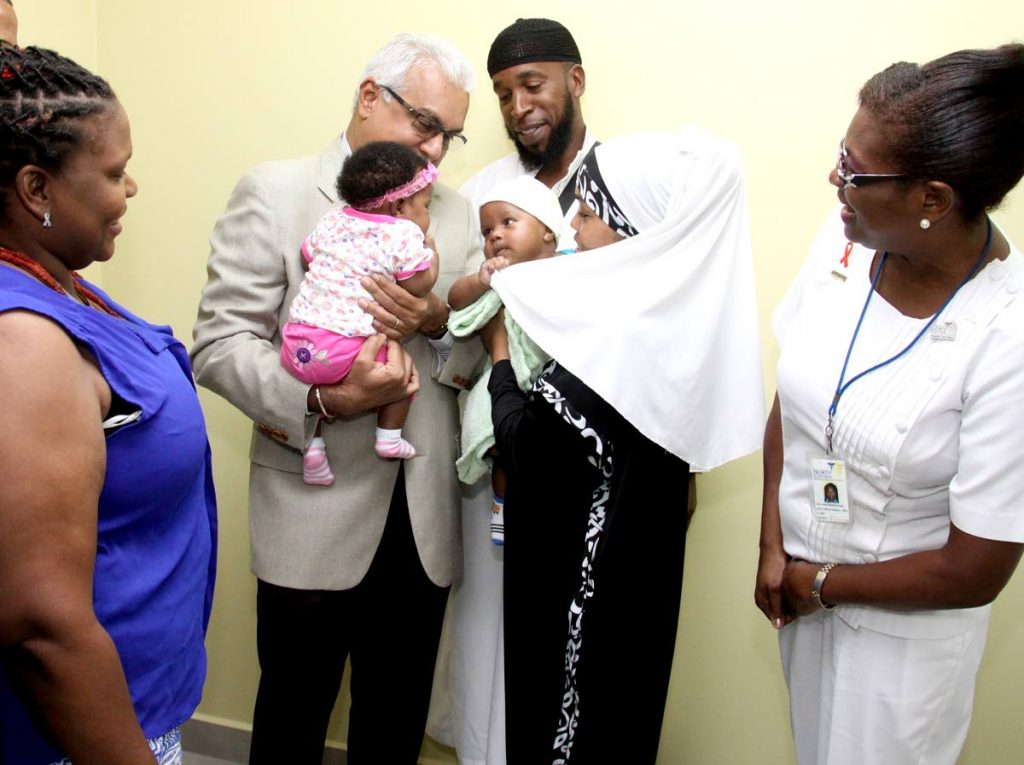Guardian angels: NCRHA takes post-natal care to mothers’ homes

The idea for the North Central Regional Health Authority’s (NCRHA) new post-natal home care programme came about because of the death of a young, healthy, first-time mother who had a bright future ahead of her.
Speaking to Sunday Newsday, nursing administrator at Mt Hope Women’s Hospital, Claudette Fraser Udika, recalled that in 2015, a 26-year-old mother was discharged from the women’s hospital while the baby remained as a patient at the neonatal intensive care unit.
She said, at home, the woman had complications and was having pains but she and the husband thought it was normal for post-pregnancy patients. A few days later, by the time they realised something was seriously wrong and took her to the Arima emergency department, she died.
“Because the baby was in NICU they were focussed on the baby and she was at home with no one to identify her deteriorating condition... So we decided we had to come up with some intervention where we could get to these people in the communities.”
With the motivation to save lives, the nurses and midwives of the breastfeeding and postnatal home care units of the hospital collaborated to create the programme, which was launched on January 21 after a one-year pilot.
Udika explained when mothers were discharged from the hospital, a primary care appointment was scheduled for six weeks later. She said a home visit within the first ten days would fill in the gap between the discharge and the scheduled six-week appointment. This would allow nurses to capture any issues before they reached a critical stage, preventing the mother or baby from having to visit the emergency room or being warded.
The programme’s focus was on high-risk mothers, including women who had caesarean sections (C-sections), women who were hypotensive or diabetic, teenagers, and first time mothers. The nurses would contact the women after they gave birth to encourage exclusive breastfeeding, monitor vital signs, and generally follow up to see that their health was back on the right track.
“They all needed additional support and education as to how to manage themselves and their newborns. Our intention was to ensure these mothers maintain a level of good health for both themselves and their babies.”
Udika said she had seen cases where babies had rashes or infections and the parents did not know what to do. In such cases, nurses would give advice and make recommendations.
Meanwhile, on their return home, some mothers had complications which they believed were normal, some did not feel well enough to go to the hospital and some had other children at home which they could not leave unattended.
She said it was very painful for women who had C-sections to move about because they were not fully healed. The nurses would visit the homes between days seven and ten after giving birth, assess the wound site, and either dress or remove the sutures.
“As a result of that we have seen a significant reduction in infections to suture sites. As a matter of fact, since we started a year ago, no one has been admitted to our gynaecology ward for that when, in the two months prior to the initiation of our project, we had about six re-admissions.”
In addition to the physical aspect of an infection, if mothers are warded to treat the infection, they will be separated from their babies. That separation could interfere with bonding and exclusive breastfeeding.
She said new mothers were often left with bruised nipples, or babies that were not latching on to the breasts, leading to irritable babies and frustrated mothers.
Therefore, they are taught breastfeeding techniques. She added people would be surprised by the things those mothers would or would not do, things one would think was common sense, that jeopardised their health and the health of their baby.
“New and teenaged mothers may not have the support or the patience when babies become irritable. Within the home they tend to be more embracing, more engaged with what we do with and for them.”

Photos by Angelo Marcelle
Udika said they also looked out for the “baby blues” and post-partum depression. She said the visit was a channel for people to express their emotions, and midwives would know if the mothers needed to be referred to mental health professionals.
She said a midwife and an accident and emergency nurse were dedicated to the programme.
Every day, two more nurses were rostered to support them, and other nurses and midwives often volunteered on their days off. In addition, she said younger maternity nurses volunteered to ride along with the more experienced ones because they were interested in learning and being part of the experience.
Deborah Lewis, executive director and midwife at Mamatoto Resource and Birth Centre, believed the post-natal home care programme to be an excellent plan, as follow-up after a new mother was discharged from the hospital had been lacking over the years. She said the follow-up usually caught issues before they developed into serious problems, and mothers and babies had to go to the hospital.
“I would just really want to support and encourage them as it goes along and say that it absolutely makes a difference, even in terms of breastfeeding support because it’s really easy to give up when you don’t have someone to ask questions or to encourage them to do it or to help. I hope the unit expands and develops as it goes along.”
She said Mamatoto put a lot of emphasis on post-natal follow up. In fact, she said a new mother’s first post-natal visit was usually one hour long. She said the centre took the opportunity to educate people on nutrition and other issues because during and after pregnancy was the only time some women accessed health care. “It’s an investment of our time because those families tend to have less complications during and after the pregnancy.”
Lewis said, in her experience, the main problems were mothers not breastfeeding properly so babies were not gaining weight, making sure the mothers were healing well from any stitches, and emotional and psychological health.
She added that breastfeeding was very important as it impacted people when they grew to be adults in terms of non-communicable and other diseases. Also, she said while the “baby blues” was normal as new mothers often had hormone imbalances or felt overwhelmed, it could go past normal to post-partum depression which was a lot more common than people acknowledged.
“My hope is that all the RHAs will see the impact of implementing a similar programme, the concept of the follow up, and the access.”
However, Idi Stuart, president of the TT Registered Nurses Association was not convinced the programme would last and felt instead that the Ministry of Health should re-energise district health visitors (DHV).
Stuart explained that DHVs visited the homes of patients with a variety of issues with the purview of preventative care, and that about 50 per cent of their focus was on post-natal care – the same work the nurses of the post-natal home care programme would do. District nurses, he said, were supposed to visit the homes of people who were discharged from hospital and assist them in following the instructions of the doctors, changing bandages, and generally ensuring patients took care of themselves at home.
He said the World Health Organisation’s standard was one DHV for 5,000 people but data from 2016 showed there was a deficit of 77 DHVs in the country. He added that of the 157 DHVs actually employed by the various RHAs, about one third had already retired and were “just holding on.”
He said there were 15 people close to completing the DHV one-year post-bachelor programme at the College of Science, Technology and Applied Arts of Trinidad and Tobago but that number represented the first cohort to complete it since the University of the West Indies stopped its DHV programme three years ago.
“Right now there is a serious shortage because they have not been training DHVs. All the minister (of Health) has to do is restart the training for district health visitors because he and the Ministry of Education are in control of that.”
He said the Health Ministry was trying to create something “new” to get praise for it when all that was needed was to revisit what worked in the past for things to improve. “We have broken down all the systems that would prevent the overcrowding on the wards. Now, you go to the A and E (accident and emergency), the doctor gives you an injection, you don’t even know what you’ve been diagnosed with, and they send you home. Then we see those same persons coming back every week, every month, and the clinics are filled.”
Stuart said he believed the programme would break down, and it would be a waste of money, especially if the next government did not support it. “It comes like the Couva Children’s Hospital. The Government ups and decide to build a children’s hospital but where is the data to show we have a growing population of children that need specialised care? Furthermore, do we have the specialised care to give them in TT? Because there is one neonatologist in Trinidad, and before that we only had one other. We just do stuff and we spend money with no real thought.”
However, Udika defended the women’s hospital’s programme saying that the DHVs had a wider scope of health issues to cover so many new mothers were “falling through the cracks.” She said the nurses wanted to save lives so it did not matter to them that DHVs were responsible for checking up on these mothers and their babies, and they would continue even if the DHVs numbers were bolstered.


Comments
"Guardian angels: NCRHA takes post-natal care to mothers’ homes"